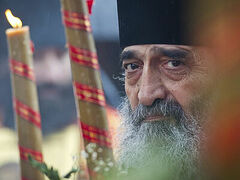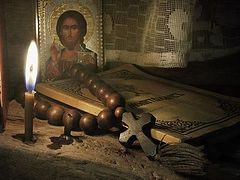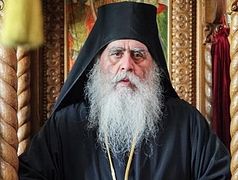With so many things said about love today and people thinking that love is a passive process, I would like to talk about love as a driving force in people’s lives. Living without love is like having a car without the engine.
We believe in the power of love. To support this great truth, I would like to refer you to the first pages of human history, as I believe that the first chapters of the Old Testament are key for understanding it. The Old Testament tells us that the Trinity, moved by endless love, created the world and made man the crown of creation in this great paradise. The word “world”—κόσμος—is translated from Greek as “beautiful accomplishment”. The world was Paradise and man lived in Paradise. However, we must not simply perceive Paradise as some delightful location, for it is more than that. It is a harmonious relationship between man and God, neighbors, nature and man’s own “ego”. In other words, Paradise existed as long as love was thriving as the connecting link. This was the main condition, or instruction, if you will, for the existence of the world.
When we buy a car, a dishwasher or any other appliance, the salesperson gives us the operating manual and says that if we follow this manual, our car or appliance will work properly.
Let us assume that the economic crisis happened, and I decided to fuel my car with water rather than gasoline. Naturally, the car won’t go, moreover, it will break down. Whether we like it or not, the car works on gasoline, diesel or propane rather than water. This is specified in the car’s operation manual. There are also other instructions about changing oil and other maintenance procedures.
So, can we say that the fact that our car works on gasoline rather than water is the car’s weak point? Can we say that a person’s wish to follow instructions and his destiny is weakness or apathy?
Holy Scripture is a Book with instructions, and by following these instructions, people can truly live.
However, the instructions were not followed, sin led to destruction of harmony, and Paradise turned into a valley of tears. The connecting link was broken. At first, people lost their connection with God, then with their neighbors, nature, and themselves. We see this in the actions of the first people immediately after their fall from grace. What happened to our forebears? They were in shock—love was gone, replaced by shame, fear, and estrangement. People were living in a state of madness, severely tormented by sin. Do you remember what Adam did? He heard the voice of God, but instead of meeting God and talking to Him like a child to a parent, he ran away, ashamed and afraid.
Paradise is a harmonious and affectionate agreement with God, other people and the world as whole.
People lost Paradise as a harmonious and affectionate agreement with God, they destroyed their relations with God and then with their neighbors. Do you remember when Adam first saw Eve? He exclaimed in that first love song: “This is now bone of my bones, and flesh of my flesh.”
But what did he say to God when he sinned?
“I’m not guilty, Eve is guilty, she gave me the apple, so it’s her fault!”
Naturally, Eve objected.
“I’m not guilty, it’s the serpent’s fault.”
That was how the relationship broke off. Adam was already referring to Eve as “she” and not as “Bone of my bones”.
This relationship was destroyed, and the harmony was broken; but the memory of Paradise remained. Man left Paradise, settling across from it, while an angel with a fiery sword guarded it so that man could not get in. This is symbolic, of course: the fact that Adam looks at Paradise speaks of his living memory of this place. So, what does he do? In the hymns of the Cheesefare week we hear that Adam sat down and cried, remembering Paradise.
“I will no longer delight in thee,” he said.
He wept for what he had lost. This shows the unquenchable thirst of man for lost Paradise and lost love. Man wanders around trying to find the lost Paradise and lost love again but chooses the wrong path, the path of selfishness and egotism.
Instead of giving our love to others, we focus on ourselves and this is a demonic distortion of love.
Elias Voulgarakis wrote:
“People’s thoughts and words about love are usually one-sided, as they see and feel only a part of it. In some cases, it is experienced as something painful, in a way that sometimes results in pathology. Most frequently they completely reject it. However, here we talk about selfishness and indifference rather than hatred. The Church teaches that love is a universal phenomenon experienced not only by people but by animals too. The Church also teaches that the entire universe is made of love and that love is the underlying law upon which the Church’s functioning is based. Love is the axis around which the entire world revolves. Even evil, no matter how impudent it seems, is governed by the law of love. Nobody does evil without trying to turn it into their own benefit. In other words, evil is the result of selfishness, which is love distorted to the extreme. The absence of love and its distorted form—selfishness—these are the causes of evil.
“Selfishness is a form of love with an opposite aim. Instead of giving our love to others, we focus on ourselves; and instead of helping us to unite with others, selfishness, that distorted form of love, leads us to self-centeredness and isolation. Instead of sacrificing themselves for the sake of others and enjoying the interaction with them, people exploit others, which results in complete spiritual destruction and loneliness. Regrettably, loneliness has become the disease of our generation. We pay this huge price because we have renounced Christian love. In some church texts, hell is described as a place where people are tied to each other back to back so that they can’t see each other’s faces and talk to each other. It is too bad that people normally don’t think that this is what hell is like.”
Selfishness or egotism is the total opposite of love. It means that people inwardly rise up against God, their neighbors and nature. We won’t discuss the other consequences of this and focus only on how it affects our relationships with others. The other person ceases to be your brother or neighbor and turns into your enemy, adversary or competitor. The first pages of human history are smeared with Abel’s blood. The first death was violent and fratricidal. Ever since that time, people have been toiling to improve the methods, means and weapons of murder, to make sure that there would be no survivors in the war.
The entire history of humankind is a tragedy. It is a history of wars, violence, and constant bloodshed. We see this happening today, not so far from us—in Syria.
God is Love and He showed us the way out of this hopelessness. God’s love is manifested in various ways. Its most wonderful manifestation is when God sent His Son to earth and He became Man, and sacrificed Himself with the sole purpose of saving all people, restoring peace between people and God, breaking down the wall of shame, and opening the gates to paradise. Non-believers think that Christ’s crucifixion was extreme weakness, and as the apostle said, people think it is “foolishness”. In fact, it is the greatest power, a manifestation of the perfect love. When Jesus knew that his hour was come that he should depart out of this world unto the Father, having loved his own which were in the world, he loved them unto the end (Jn. 13:1). He still demonstrates His perfect love. How? On the cross. This unique action of God teaches us that the deepest meaning of love is selflessness. The cross may help people restore their relations with God, neighbors, and all creatures. The shattered world may still become whole, become a Church, a family. Love is the driving force for all that, as love is the main trait of a Christian.
Christ said, By this shall all men know that ye are my disciples, if ye have love one to another (Jn. 13:35).
The path to God runs through relationships with other people. You cannot be close to God if you cannot maintain good relations with your neighbors. Today people ignore, distort, or forget this great truth. The lesson we learn in our childhood is anti-Gospel and anti-Christian: “The other people? They are bad, they are your adversaries and enemies. They can only hurt you, they don’t love you and don’t deserve your love.”
It has come to the point that we don’t see other people as our brothers and companions. Instead we think that as Jean Paul Sartre said, “hell is other people.” Away from God and their neighbors, we are fixated on our egotism, deify ourselves and reach a demonic state. And this is hell. St. Maximos the Confessor wrote wonderful texts on love. He said that the people who are joined with God and maintain this connection through prayer and love become wise, kind, humanly, merciful, and compassionate, and their minds contain almost the entire divine charisma. On the contrary, people who are hooked on material values become concupiscent, beastly, brutish and are always at war with others.
Those who don’t love are not wise.
People without God start to resemble animals or beasts. As St. Ephraim the Syrian said, “Those who don’t love are not wise.” Not wise means foolish. There you go!
Today we live in such a demonic state, in this hell. The bad thing is that we have grown used to it and believe that it is natural. As we noted above, Sartre said that “hell is other people”, so any relation with others, even if it is love, is bound to fail. And this is what Sartre calls humanism! Serbian bishop Atanasije (Jevtić) noted that such anthropology is demonic, it is demonology.
Church teachings oppose this demonic humanism. In Church, people have the opportunity to experience love—if they want it, of course. For people can be religious and yet behave like they are not. A person who believes in God doesn’t think that hell is the other people, for him other people are neighbors or brothers and sisters. Other people are paradise, eternal life, and joy. It is not just theory, it is practice. The Church demonstrates this through the saints. St. Anthony the Great said that “our life and our death is with our neighbor. If we gain our brother, we have gained God, but if we scandalize our brother, we have sinned against Christ.”
St. Apollos wrote: “When we see our brothers, we bow to them, because we in fact bow to God rather than to them. If you have seen your brother, you have seen your God. Don’t try to see God with your own eyes, for if you have seen your brother, you have seen your God.”
If we gain our brother, we have gained God, but if we scandalize our brother, we have sinned against Christ.”
St. Ammonius has a very good text that we must frame and read every time we think about judging others.
“True love doesn’t hate, mock, judge, insult, neglect, or oppress anybody—neither believer, nor unbeliever, neither sinner, nor the fornicator or the unclean. On the contrary, it loves sinners, the infirm, and the negligent. A Christian suffers, mourns, and weeps for them. A Christian mourns more about evil people and sinners than about good ones. This is how you show your respect to Christ, Who called upon the sinners to repent and shared with them food and drink. So, show true love. As Christ taught us, Be ye therefore merciful, as your Father also is merciful (Lk. 6:36), For he maketh his sun to rise on the evil and on the good, and sendeth rain on the just and on the unjust (Matt. 5:45). So if you have true love, you love everybody, treat everybody well and pray for everybody.”
St. Basil the Great was motivated by love, and that was why the famous Basileiad was built to help the needy. You probably don’t know it, but he was a doctor. He had seven degrees as they would call it today – and one of them was in medicine. So, what did he do? He tended the lepers in hospitals and personally cleaned their terrible wounds. And that was not all! St. Basil washed their wounded hands and feet and kissed them, because he believed that that was his way to kiss the feet and wounds of Christ. Who knows about this today? They say that St. Basil was a scholar and a spiritual writer. But what did we talk about in today’s sermon?1 Was he really like that? Perhaps, he simply empathized with the human pain and that was why he dedicated himself to serving people.
St. Symeon the New Theologian said, “We must see Christ in the faces of other people and feel love and desire to sacrifice our lives for their sake.”
When anybody came to visit St. Seraphim of Sarov, he would greet them, “My joy, Christ is risen!”
The other person was his joy. You see how different it is from Sartre who said that “hell is other people”? Sartre would have said, “You’re my hell, get out of here!”
But St. Seraphim said, “Come in, my joy!”
This was the love that moved St. Luke of Simferopol and all other saints. They all were overwhelmed by love for people. Have you read the hagiography of St. Luke? He was a talented artist and could have made a brilliant career, but he thought, “Can I do what I like when there’s so much pain and suffering around?” He made the decision and with great difficulty, as physics and chemistry were challenging for him, he was admitted to the medical faculty.
“What are you going to do now?” St. Luke’s classmates asked when he graduated from the medical faculty with honors.
“I’ll be a village doctor,” he answered. “I’ll go to the country to treat poor people.”
“You can’t be serious! You’re a born scientist and you are going to the country to treat poor peasants?”
“It was very painful to hear such words,” he wrote later, “because people didn’t understand that I studied to become a doctor with the sole purpose of helping the poor all my life.”
Naturally, that was exactly what he did.
Spies were following him in Simferopol and other places twenty-four hours a day. From the published archive documents, we learned that his chauffeur, priests, and people around him spied on him and denounced him. However, when these people got sick, they didn’t go to any other doctors, they came to St. Luke and he treated them, even though he knew that they had been spying on him.
I will finish my monologue with the following story. Some of you have visited the Holy Land, the land where Christ walked. In Palestine, there are two lakes: a small one, called the Sea of Tiberias, and a big one, known as the Dead Sea. The small lake is thriving, there are a lot of fish there. This was where Christ’s disciples came to fish. The big lake or the Dead Sea is lifeless. Here’s a paradox for you: the small lake lends its waters to the River Jordan, which flows into the Dead Sea. It is paradoxical that the small lake does not dry out, and it has had fish for over 2000 years. The big lake, the Dead Sea, receives the life-giving water but remains lifeless.
This is the nature of love. Meanwhile, we often say, “I did so much for a person, but he turned away from my love and did something bad.”
Even this shows that we have no love. We make a deal—I scratch your back so that you’ll scratch mine. This is not love. True love is like the Sea of Tiberias. The lake gives water without expecting anything in return. It doesn’t expect any gratitude and stays alive. If a person has learned to steal and hurt others since childhood, such a person will remain dead. His nails, hair and beard may grow, he may be tall, and his hair may turn grey, but in reality, this person is dead. Man is dead without love. The story of the two lakes shows us the true nature of love.
In the desert, monks were so poor that they only ate bread and salt. Once one ascetic was given a bunch of grapes. Imagine having grapes in the desert! The ascetic was very happy and thanked the person who brought him this gift. Then he thought, “I like grapes, but so does one elder I know. I’ll take this bunch of grapes to him.”
And he did. The elder was very happy and thanked the ascetic. Then he told himself, “I like grapes, but it is better to give this bunch to another monk who is further up!”
So he did. The other monk gave the grapes to his spiritual brother. The fourth ascetic did the same. And the grapes were returned to the first monk. This is what love is. None of the monks could eat the grapes because they loved their neighbors.
I’ll tell you another story. One man wanted to find out what is Paradise and what hell is. So, an angel told him, “I’ll show you what Paradise and Hell are.”
So he took this man to hell. There was a festive meal, beautiful curtains, and bright light. The table was full—there was an abundance of food. But the people were unhappy because their arms were too long, so they could pick up the food but couldn’t put it in their mouths (in another version of this story the people had long spoons and couldn’t eat from them). They tried to eat but couldn’t.
“Look, this is hell,” the angel told the man.
Then the angel took the man to Paradise. It looked basically the same – same setting and same meal. People still had long arms, but they were happy and satiated. Why? They couldn’t eat themselves, but they were feeding each other.
“This is Paradise,” the angel said.
God is Love. Through the prayers of saints, let us feel that love and answer to the great love of God Who came to earth and became Man so that we would live with others in peace and harmony.





